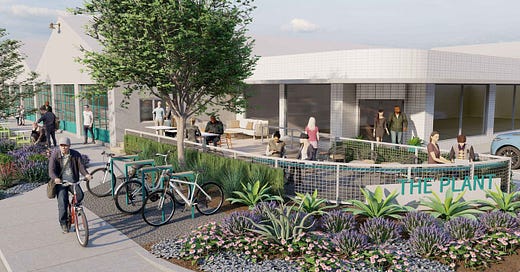Heya friends, happy Friday!
I am on week two of sharing extra little tidbits about what I’m reading/eating/doing in the “extra bits + bobs” sections and I thought you’d all like to know that the recipes have overtaken all transport news as the most clicked links 😂 I’m glad that the Venn diagram of foodies + transport nerds is essentially a circle. Please continue liking and commenting! It truly makes my day / week / year.
Finally, there will also be no newsletter next week as I will be in Vegas for a Taylor Swift concert, likely questioning the absurd urban planning practices of Vegas and losing my voice.
Ok, onto ze news!
Government and Policy
Car free living is taking off in car centric cities
Bloomberg has a deep dive on how traditionally low density, car centric regions are started to think more holistically about new developments—and how those developments can be built with a people-centred road hierarchy.
“The majority of Americans want to live in car-free neighborhoods,” said Ryan Johnson, co-founder and chief executive officer of Culdesac. “We just haven’t been building them since the advent of the car. The areas that are walkable have just gotten more expensive, which has made the demand higher.”
What I appreciate the most about this article is its simple reminder that there’s nothing radical about walkable urbanism—it is quite frankly the template for cities since they first appeared. We’re just now getting back to that very efficient design.
Cambridge is partnering and piloting on AVs
Across the pond a new study is kicking off in Cambridge that will “look into how self-driving technology could improve public transport and investigate potential routes where automated vehicles could operate exclusively from other traffic, to relieve congestion.” The Cambridge Autonomous Rapid Transport (CART) study will begin in March 2023, supported by a with a grant from CCAV’s Connected and Automated Mobility programme in addition to industrial contributions.
Industry
British start-up Oxbotica is pivoting away from individual AVs towards vehicles that have very specific roles (such as surveillance vehicles for heavy industry). According to Oxbotica CEO Gavin Jackson: “Our vision is to unlock the value of self- driving technology but where there are the most pressing and urgent requirements.”
Personally, this is a welcome shift. As I will ramble on about below, AVs are not a solution for general everyday transport—we’ve got trains, bike lanes, and improved bus service for that! Thinking critically about how this technology can be applied to society in an impactful way is … kind of refreshing to see?
And supposedly the deal is a wash for Citymapper investors. While Citymapper is well known for its superior trip planning capabilities, the mapping start-up has long struggled to commercialize it’s business. In an iconic move the company once ran a bus through London, only to realize that bus services aren’t actually profitable (unless publicly funded, who would’ve thunk).
Cruise’s CEO says AVs “will soon rule the roads”
Ooof where to begin..
Having any one piece of technology “rule” the road, is just freightening. Cars already have outsized power on city roads, and the prospect of that trend continuing is not inspiring in the slightest.
Stating that ‘humans are so bad at driving’ is such a cop-out. Humans are “bad” at driving typically because our infrastructure and land use sets nobody up for success. Improved infrastructure—from curb radii and street width and speed limits—vastly improve driver safety. The CEO implies that if only cars were better we’d solve system-wide problems, which is a very limited way of viewing the problem.
What is going to make our roads safer is better roads. Its safer designs, and mixed use, medium density developments paired with transport options that are more reliable and accessible than cars. It is not a car that is marginally better at driving than a human.
Opinion
Paris Marx on the future of transport
Newsletter fan favourite, Paris Marx, is featured on an episode of the BBC’s Instant Genius podcast where they discuss what the next 50 years of transport could look like in cities and rural areas around the world.
Experts predict AVs won’t arrive until 2035
“While the technology behind [AVs] is becoming more affordable, the cost of building and maintaining the infrastructure needed to support them is still high and complex.. Additionally, there is a significant investment needed in research and development to ensure that the technology continues to evolve and improve over time.."
Podcast: Why AVs may never come
Bloomberg’s Big Take podcast also has an episode about why the implementation of AVs is so precarious—featuring Anthony Levandowski the famed Waymo employee who was sued for stealing trade secrets. “For years now, we’ve been hearing that autonomous vehicles are just around the corner. Google, Uber, General Motors, Tesla, and other companies invested huge sums in hopes of realizing the dream of a car that drives itself on the open road. And yet, after more than a decade of effort and prototypes, driverless cars still appear to be a long way off.”
Extra Bits + Bobs
Fun fact: My life-long goal is to daylight a stream, and this article from the Smithsonian talks about the past, present and future of daylight streams. If you’re unfamiliar with the concept, it’s absolutely worth a read!
I am in a fairly committed relationship with this recipe for tomato confit. It sounds ~fancy~, but takes about five minutes to prep and an hour in the oven. I now spend my days wondering “is there a single meal where tomato confit wouldn’t be good?” and the answer (after three months of research), is a resounding no. Every meal is indeed made better with tomato confit. Bon appetit.
That’s all from me. Have a beautiful weekend friends.
Sarah




